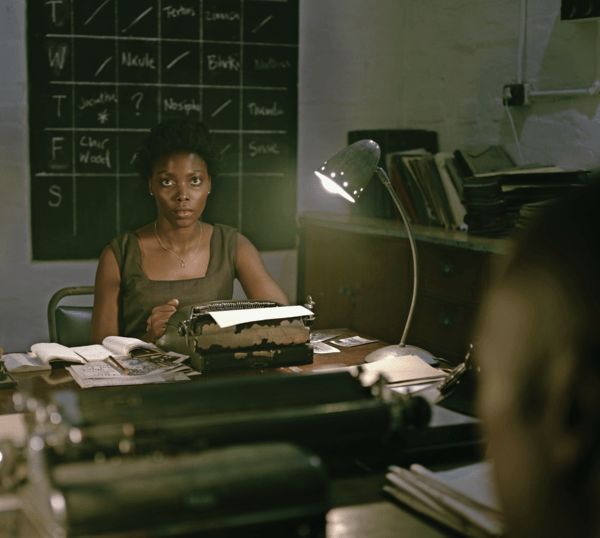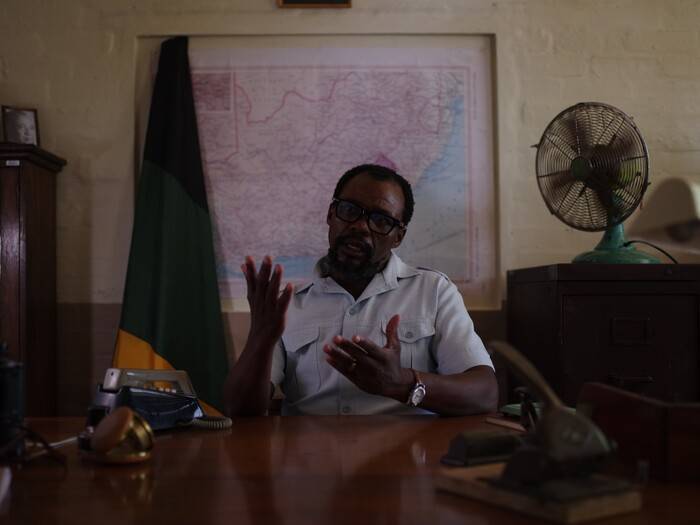Keeping it reel: Gordon Main (left), director of London Recruits, which premiered at the Johannesburg Film Festival.
“Not every day a boy from the Bronx gets involved in the revolution.”
Young lefties around the world were inspired by Che Guevara at the time but nerdish American Danny Schechter knew he stood out like a pale thumb on his first top-secret ANC mission in late 1960s Durban.
He scanned the streets of white Durban and found his solution — buy shorts!
Schechter, who went on to become a revered television producer, filmmaker, author and media critic, recounts this hilarious story in the brilliant new documentary London Recruits, which opened the Johannesburg Film Festival this week. (The interview was done a few weeks before he died in 2015.)
It covers an era when the banned ANC was against the ropes. Nelson Mandela and other leaders were in prison, Oliver Tambo was in exile in Zambia and MK was basically dormant.
But Tambo had a unique plan to raise the movement’s profile in South Africa. London Recruits tells the fascinating secret history of how young ANC activist Ronnie Kasrils recruited 60 youths in London between 1967 and 1973 to go on 50 missions to South Africa, to set off countless “bucket bombs”, distributing over half a million ANC leaflets in the country’s five major cities.
Messages such as, “The ANC says to Vorster [BJ Vorster, South Africa’s prime minister at the time] and his gang: Your days are coming to an end … We will take back our country!” exploded onto street corners in Joburg, Cape Town, Durban, Port Elizabeth and East London.
Kasrils had enrolled at the London School of Economics, where he recruited Schechter and other young white progressives. The apartheid regime assumed that all white people sided with them. The visitors would therefore not arouse suspicion.
The two-person teams would pretend to be business people, tourists and honeymooners, each with suitcases with false bottoms full of the illegal pamphlets and explosives to make the bombs, and do the job. Simple enough.
But the stakes could not have been higher. Not all of them made it home again. Two recruits, Sean Hosey and Alex Moumbaris, got caught — and the regime was not taking this lightly. Hosey was jailed for five years and Moumbaris was sentenced to 12 years in prison but escaped after seven.
I’m meeting the 50-something Gordon Main, London Recruits’ Welsh director, on the afternoon before its world premiere in Sandton.
This labour of love has taken him nearly 10 years to make. In 2014, in Cardiff, Wales, a part-time researcher told him about one of his Socialist Workers Party comrades who had been on one of these missions.
Main said: “And I was like, ‘When was this?’
“And he said, ‘It was in the late Sixties, early Seventies — there were loads of them.’
“And I said, ‘I don’t think so, I mean, I’m a historian … and I knew a lot about apartheid because, obviously, it was a very active issue when I was in university in the UK.’
“And I was thinking, ‘We’d know about this, this would be a famous story if it was known,’ and so I was doubtful, and he said, ‘I know there’s a book; they’ve written all their memoirs in a book. I’ll get hold of it.’”

 Stalwarts: Tumelo Nkwanca (left) as ANC activist Joyce Sikakane and Sam Medupe (right) as founding father Oliver Tambo in the documentary London Recruits.
Stalwarts: Tumelo Nkwanca (left) as ANC activist Joyce Sikakane and Sam Medupe (right) as founding father Oliver Tambo in the documentary London Recruits.
There was such a book, written by former recruit Ken Keable, who published their first-hand accounts in London Recruits: The Secret War Against Apartheid.
In September 2014, Main found out that Kasrils was in London. They were the third film company to show an interest in turning the story into a movie. Kasrils and a little committee of recruits summoned them to pitch.
They won and, for Main, the rest became history, culminating in London Recruits flickering to life on the wide screen on Tuesday night.
I prepared with a double espresso. Sometimes political doccies — even ones with a cracking storyline like this one — can be earnest, self-important and boring. But, at the end, I burst into spontaneous applause with the rest of the audience.
There are many reasons why it worked so well — a combination of using the larger-than-life Kasrils; lively interviews with several of the original recruits; the story of ANC activist Joyce Sikakane, who witnessed one of the bucket bombs exploding in Johannesburg; truly spectacular and wide-ranging footage beyond the typical apartheid-era material, including some sourced from private archives; re-enactments with well-cast actors; excellent cinematic storytelling and superb editing.
Main adds about the recruits: “They’re in their late sixties, some in their early seventies.
“But they come alive when they’re talking about this. I could just see their younger selves.”
He also pulled off a major coup by getting two Security Branch cops, who were involved on the other side, to be interviewed: Herman Heymans of the SB in Durban at the time and the notorious Colonel Vic McPherson who, despite his advanced age, still sent shivers down my spine. Butter still wouldn’t melt in their mouths.
Main says he and his team are genuinely honoured to have their premiere at the Johannesburg Film Festival, especially at a time when South Africa is taking the lead in exposing the genocide in Gaza at the International Court of Justice.
I ask him why, in a deeply divided world, London Recruits, a film about the 1970s, should resonate with people across borders.
“Is it a British story? Is it an African story? Is it a South African story? Is it a white story or is it a black story? None of those things … It’s a universal story.
“And I love that about it — that it’s genuinely about a world where we don’t accept these divisions, where we say, ‘No, we are all one.’”
London Recruits will be screened again at the Johannesburg Film Festival at Ster-Kinekor, Sandton, at 1.30pm on Sunday 3 March.